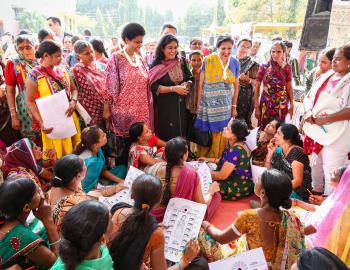ESSENTIAL: Building on local knowledge for climate compatible development
ESSENTIAL: Building on local knowledge for climate compatible development
All effective action starts with a sound knowledge base. When it comes to increasing resilience to climate change, often decision-makers seek scientific knowledge about climate change effects, while local knowledge is under-used or ignored. While local information and data may not be readily available, awareness raising and capacity-building can sensitise communities and enable them to contribute to their local development processes. Partners in the CDKN–ICLEI Subnational Learning Programme have explored a variety of approaches to identifying and leveraging local knowledge for informed decision-making and planning. Combining local knowledge with scientific data fills information gaps and yields the most effective knowledge base for local governments.
Key findings
- Offer tailored training to help local government staff understand the links among the various aspects of climate compatible development. Local government staff need to be able to identify the connections between their communities’ challenges and climate change effects, and to translate this knowledge into strategies and actions.
- Use locally attuned approaches to raise community awareness, start a dialogue and capture local knowledge. Connecting climate risks to local development and creating a knowledge pool provides a foundation for long-term climate compatible development. This usually requires cooperation between staff familiar with the local context and researchers with specialised inputs.
- Develop an approach to manage local knowledge. It is vital to have a strategy for collecting, managing and sustaining local knowledge and ensuring its accessibility.
- Use local knowledge, information and data as a basis for addressing climate challenges and development. Though often incomplete, local knowledge is a good starting place for climate compatible development. The community is more likely to ‘own’ the development process when it is based on their knowledge.
- Complement local expertise and experience with scientific information to establish the best possible knowledge base for planning climate compatible development. Having a thorough understanding of local knowledge makes it easier to know what additional information and guidance is needed from local or external researchers.



